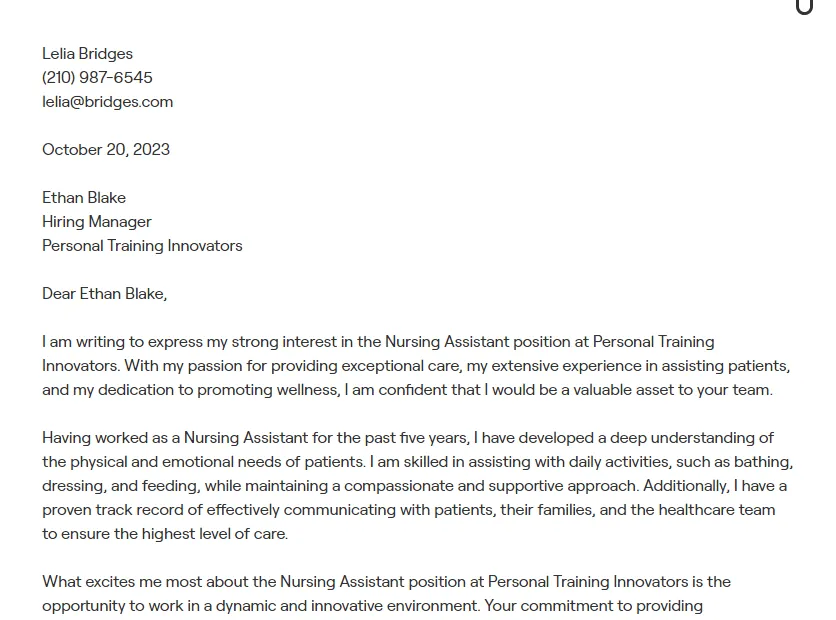Why Nursing Cover Letters Are Important
In the competitive field of nursing, a well-crafted cover letter is your first opportunity to make a strong impression on potential employers. It serves as a crucial introduction, setting the stage for your resume and showcasing your unique qualifications and passion for patient care. Unlike a resume, which provides a chronological overview of your experience, a cover letter allows you to tell your story, explain your career aspirations, and demonstrate how your skills and experiences align with the specific needs of the healthcare facility and the nursing role. It is your chance to go beyond the facts and figures, conveying your personality, enthusiasm, and commitment to providing excellent nursing care. Ignoring this important step might cause you to miss an important job opportunity.
Highlighting Key Skills and Experience
Your nursing cover letter should clearly and concisely highlight the skills and experiences that make you an ideal candidate for the position. Focus on the requirements outlined in the job description, and provide specific examples of how you have demonstrated those skills in previous roles. Quantify your achievements whenever possible, using numbers and data to illustrate your impact. For example, instead of saying you ‘managed patient care,’ you could say ‘managed the care of 20+ patients daily, ensuring adherence to medication schedules and care plans.’ Highlight experiences relevant to the specific role and the healthcare facility’s focus, such as experience with electronic health records, specific medical equipment, or specialized patient populations. Make sure to also include your professional certifications.
Examples of Skills
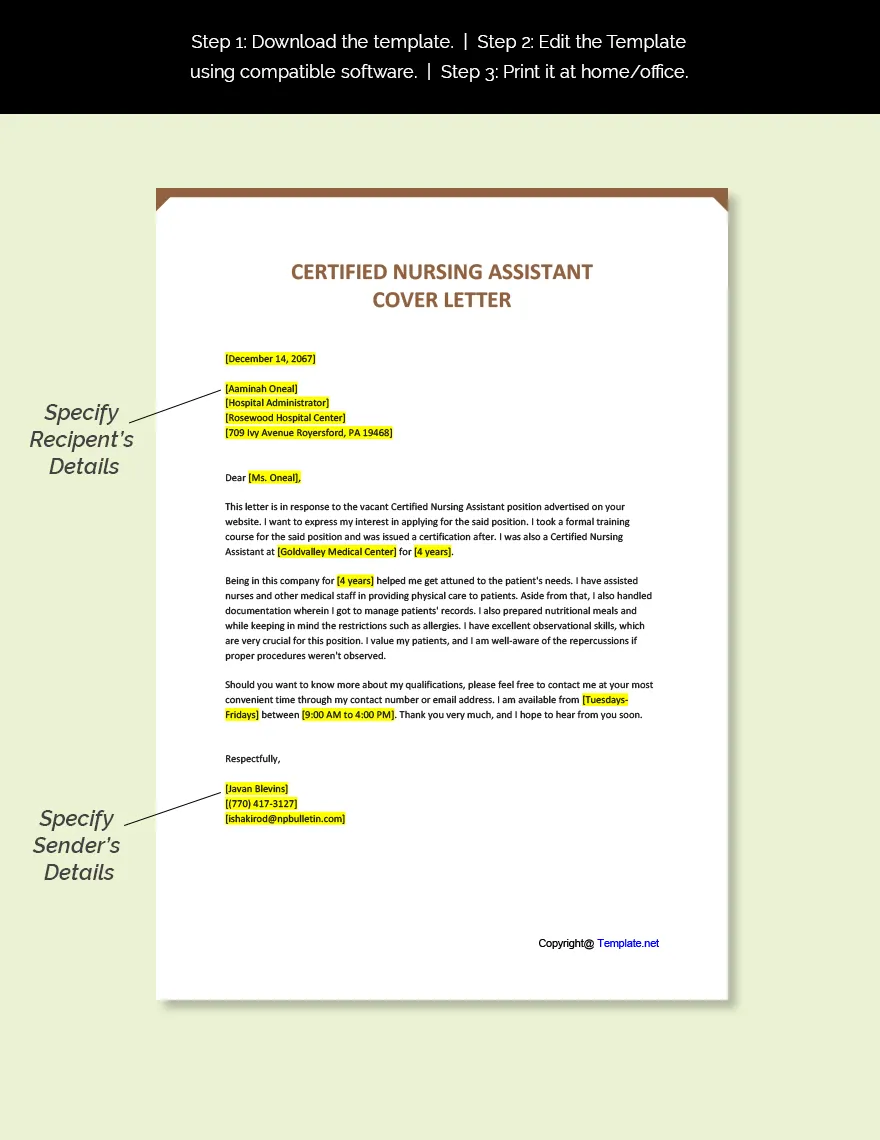
- Clinical Skills Assessment and Diagnosis
- Patient Education and Advocacy
- Medication Administration and Management
- Electronic Health Record (EHR) Proficiency
- Emergency and Critical Care Procedures
- Infection Control and Prevention
- Teamwork and Collaboration
- Leadership and Management Skills
Tailoring Your Cover Letter to the Job
A generic cover letter will not impress hiring managers. To stand out, you must tailor your letter to each specific job and healthcare facility. Carefully review the job description and identify the key requirements and preferred qualifications. Research the healthcare facility’s mission, values, and patient population. Use this information to customize your letter, highlighting the skills and experiences that align with their specific needs and demonstrating your understanding of their organizational culture. Mention the specific nursing unit or department you are applying to and explain why you are interested in working there. This level of personalization shows that you have taken the time to understand the role and are genuinely interested in the opportunity.
Researching the Healthcare Facility
Before writing your cover letter, invest time in researching the healthcare facility. Visit their website, read patient reviews, and explore their social media profiles to gain insights into their values, mission, and patient care philosophy. Identify any recent achievements, awards, or initiatives that the facility has undertaken. This research will help you tailor your cover letter to demonstrate your understanding of the facility and your alignment with its goals. Mentioning specific programs, initiatives, or values that resonate with you will demonstrate your genuine interest and commitment. If possible, try to find the name of the hiring manager or the person who will be reviewing your application and address the letter to them directly.
Showcasing Your Passion for Nursing
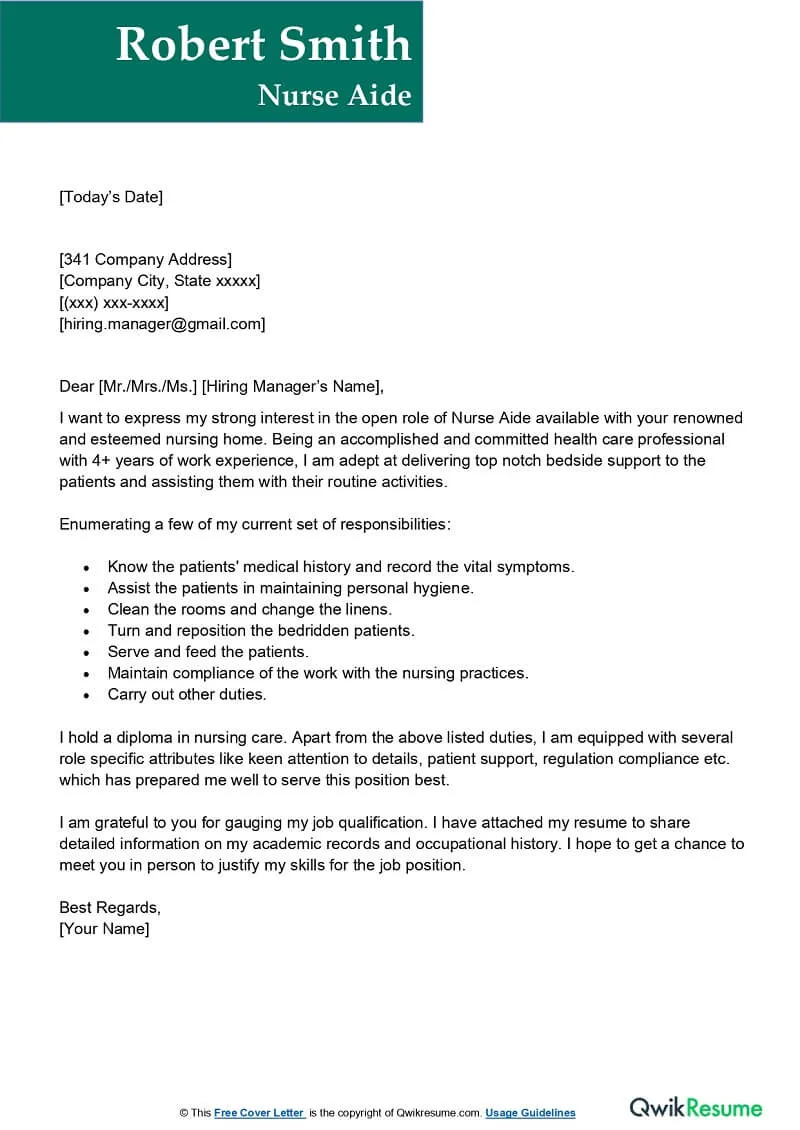
Your cover letter is an opportunity to express your passion for nursing and your commitment to providing excellent patient care. Share your motivations for choosing a career in nursing and explain what inspires you to care for others. Provide examples of your experiences that demonstrate your compassion, empathy, and dedication to patient well-being. This could include experiences providing comfort and support to patients, advocating for their needs, or going above and beyond to improve their quality of life. Be specific and use storytelling to bring your experiences to life. Your passion should be evident in your writing, allowing the hiring manager to see the person behind the resume and understand why you are the perfect fit for their team.
Structuring Your Nursing Cover Letter
A well-structured cover letter will make a positive impression on the hiring manager. Start with a strong opening paragraph that grabs their attention and introduces you and the position you are applying for. In the body paragraphs, highlight your relevant skills, experiences, and accomplishments, providing specific examples to support your claims. Demonstrate your understanding of the facility’s needs and your alignment with their values. In your conclusion, reiterate your interest in the position, express your enthusiasm, and thank the hiring manager for their time and consideration. Always proofread carefully to ensure that there are no grammatical errors or typos and maintain a professional tone throughout the entire letter.
Formatting Your Cover Letter Professionally
Professional formatting is essential for making a positive impression. Use a clear and easy-to-read font, such as Times New Roman or Arial, with a font size between 10 and 12 points. Use standard 1-inch margins and single-space your text, with a double space between paragraphs. Include your contact information at the top of the letter, including your name, address, phone number, and email address. Address the letter to the hiring manager by name, if possible. Keep the letter concise, ideally no more than one page. Avoid using abbreviations, jargon, or slang. Ensure the letter is well-organized, with clear headings and subheadings.
Writing a Compelling Nursing Cover Letter
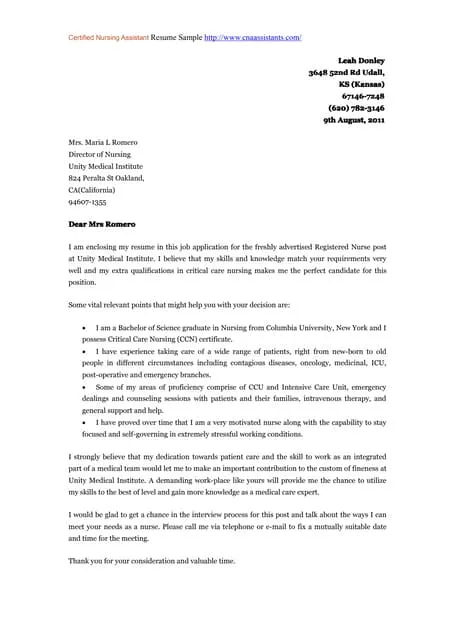
To write a compelling cover letter, focus on highlighting your most relevant skills, experiences, and accomplishments. Use action verbs to describe your responsibilities and achievements, such as ‘managed,’ ‘coordinated,’ ‘implemented,’ and ‘achieved.’ Provide specific examples to support your claims, using the STAR method (Situation, Task, Action, Result) to showcase your contributions and the positive outcomes you achieved. Emphasize the value you can bring to the healthcare facility and explain why you are the best candidate for the position. Demonstrate your understanding of the nursing role and the healthcare industry, and express your enthusiasm for the opportunity. Proofread your cover letter carefully and get feedback from a trusted friend or colleague before submitting it.
Proofreading and Editing Your Cover Letter
Proofreading and editing your cover letter is an essential step in the application process. Typos, grammatical errors, and inconsistencies can undermine your credibility and make a negative impression on the hiring manager. Carefully review your letter for any errors, paying attention to spelling, grammar, punctuation, and sentence structure. Read your cover letter aloud to identify any awkward phrasing or unclear sentences. Get feedback from a trusted friend, colleague, or career counselor. They can provide a fresh perspective and catch any errors or areas for improvement that you may have missed. Make sure your cover letter is free of errors before submitting it.
Following Up After Submission
After submitting your cover letter and resume, it’s important to follow up with the healthcare facility to express your continued interest in the position. Send a brief thank-you email or make a phone call a week or two after submitting your application. Reiterate your interest in the role, and mention a specific skill or experience that aligns with the job requirements. This shows your enthusiasm and demonstrates your professionalism. If you haven’t heard back from the facility within a reasonable timeframe, you can follow up again to inquire about the status of your application. Be polite, respectful, and enthusiastic in your communications.
Conclusion
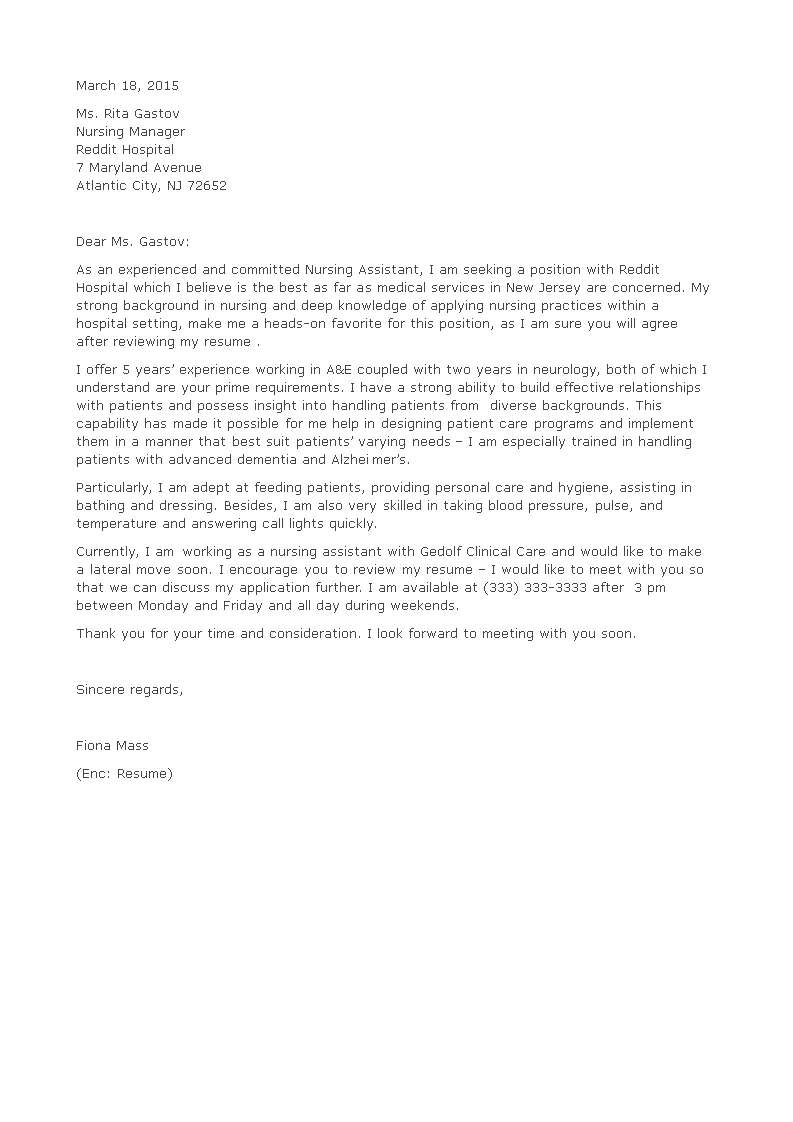
Writing a compelling nursing cover letter is crucial for showcasing your skills, experience, and passion for the profession. By following these guidelines, tailoring your letter to the specific job, and highlighting your relevant qualifications, you can increase your chances of getting hired. Remember to highlight your key skills, tailor your letter to each job, research the healthcare facility, and showcase your passion for nursing. Proofread and edit your letter carefully, and always follow up after submitting your application. Good luck with your job search and your journey in nursing!
